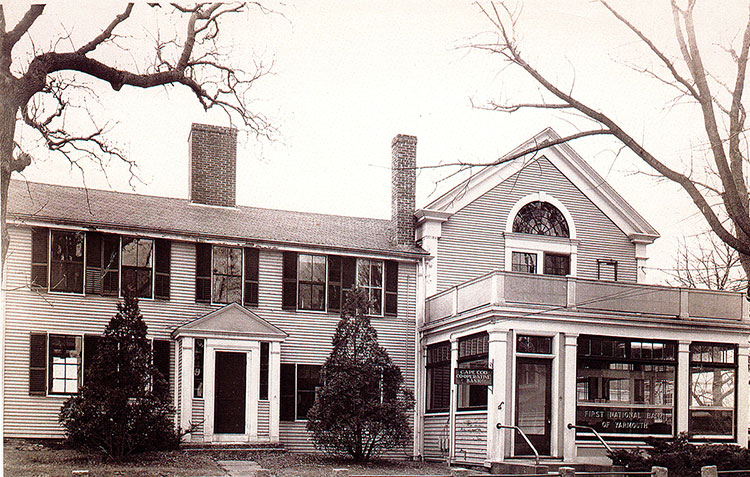
A Century of Giving Back
Cape Cod Life / July 2021 / People & Businesses
Writer: Joe O'Shea
A Century of Giving Back

Cape Cod Life / July 2021 / People & Businesses
Writer: Joe O'Shea
The Cooperative Bank of Cape Cod celebrates it’s 100th birthday by providing gifts to Cape nonprofits.
When relating the story of how her grandfather, Cummaquid resident Bernie Wilber, secured his first mortgage, The Cooperative Bank of Cape Cod’s First Vice President and Controller Katie Hartley is a little fuzzy on the details. Like most stories shared between the generations, the details aren’t as important as the lessons that the tale imparts.
“As a student, I used to spend summers working on the Cape because I was very close with my grandfather, who was a builder,” says Hartley, a native of Rhode Island. “One day I asked him why he didn’t bank with the Bank of America like I did.”
As Hartley recalls, Wilber’s response went something like this: “We don’t need big banks here. We have small banks on the Cape, and I bank at The Coop. When I went to get my first mortgage at another bank, they denied me. So I went to the bank next door, which was the Cape Cod Cooperative Bank. I told them what I did for a living, how much I earned and how hard I work, and they gave me a mortgage.”
While the bank’s name has changed slightly in the ensuing decades, The Coop’s collegial, customer-centric and supportive spirit remain the same as the bank celebrates its 100th anniversary this summer.

In fact, The Coop’s generous culture is encoded in the bank’s DNA, as outlined in the bank’s mission statement, which reads, in part, “We are fully committed to the communities where we live and work and support them with resources–human and financial–to help them flourish.”
As a result, The Coop is flourishing like never before. “I don’t think that a community bank like ours could survive–and be as strong and as vibrant as we’ve ever been – without a culture that’s primarily focused on helping our customers and potential clients to solve their problems and achieve their financial goals,” says Lisa Oliver, President, Chair and CEO. “Our purpose is to help people buy homes, start and grow businesses and build stronger communities.”
As Oliver and Hartley point out, the fact that The Coop is a mutual bank–not a shareholder-owned, publicly traded institution–enables it to focus solely upon its customers and community. By definition, anyone who opens an account with a mutual bank is an “owner” of the bank–and is treated as a shareholder. So when The Coop generates a profit, the “dividends,” so to speak, go right back to the community, whether it’s in the form of new loans, financial support for community events or charitable donations to nonprofit organizations that benefit Cape Codders.
“Where we don’t have shareholders, we don’t have to worry about our share price or pay a dividend,” notes Lee Ann Hesse, Senior Vice President and Chief Engagement Officer for the bank. “As a mutual bank, we have this wonderful opportunity to take the money that we make and reinvest it in the Cape Cod community, whether it’s in the form of providing great careers for our employees or supporting our customers and communities.”

$100K in 100 Days
To commemorate its 100th, The Coop will be celebrating in a way that might seem a bit unorthodox, especially for a bank. In the 100 days leading up to its July 19 birthday, The Coop will donate $100,000 to local nonprofit organizations.
“It’s wonderful to have a celebration and give other people gifts,” says Hesse. “When we were thinking about how to celebrate our 100th anniversary, we didn’t want to simply say how great we are. We wanted to take this opportunity to reinforce who we are by showing how much we love and support the communities that we serve.”
To be eligible for an award, a non-profit organization must be based in Barnstable County, serve Cape Cod residents and address the needs of one of the Coop’s four philanthropic focus areas for 2021:
- Financial literacy
- Covid-19 health support
- Housing initiatives
- Social justice and equity
The bank has formed a committee to oversee distribution of the funds. In addition, bank leadership has earmarked $10,000 that will be distributed to nonprofits based upon a company-wide vote. The giving decisions will be announced on July 19th.
While philanthropy has long been a bank hallmark, The Coop cemented its status as one of the region’s most generous institutions when it launched The Cooperative Bank of Cape Cod Charitable Foundation Trust in 2018. The Coop Foundation serves to enhance and expand upon–not replace–The Coop’s existing community giving program.
“We’ve always given to the community, but we gave out of our bank’s income statement,” says Oliver, the bank’s fifth–and first female–leader. “Now, if we do a good job of running The Coop Foundation, we’ll be able to make an even greater impact by helping local organizations address the region’s most pressing social needs.”
Coop Cornerstone: Always Put the Customer First
If philanthropy has been a hallmark of the bank’s business approach through the decades, then The Coop’s customer-first approach is the organization’s cultural cornerstone.
When the First National Bank of Yarmouth, a commercial bank, reached its maximum statutory limit to write residential loans in 1921, a number of bank officials, led by Director Frank Howard Hinckley, formed Cape Cod Cooperative Bank to continue providing mortgages to the community.
When The Coop first opened inside the First National Bank of Yarmouth, the new banks’s assets were a modest $1,611. Hinckley artfully guided The Coop through its infancy–which included surviving the Stock Market Crash of 1929, the Great Depression and World War II–and oversaw the building of the bank’s first physical branch in 1949. By the time Hinckley retired in 1956, The Coop boasted $4.5 million in assets.
After the brief presidency of Roswell Nye, Nye Crowell was named bank president in 1961. During Crowell’s tenure, the bank steadily grew, opening branches in East Dennis and West Barnstable. Having worked summers at the bank as a co-op student from Northeastern University, Joel Crowell would go on to succeed his uncle as bank president in 1983. Other changes were implemented when 14 years into Crowell’s 34-year leadership term, The Coop began to offer commercial loans for the first time. When the Gramm-Leach-Bliley Act (GLBA) was passed in 1999, it overturned the Glass-Steagall Act of 1933, and the runway was cleared for The Coop’s financial takeoff.
“Prior to the passage of GLBA, banks couldn’t sell insurance or investment products,” says Hartley. “The GLBA really opened the door for us to add to our existing suite of products and services.

“When I first started working for The Coop in 1996, we had $300 million in assets and three branches,” adds Hartley. “Now we have about $1.2 billion in assets, nine branches and a bank headquarters.”
According to Hartley, the one guiding question that has driven The Coop’s remarkable 21st-century growth is, “How can we better serve our customers and the community?”
In recent years, one of the more visible ways that The Coop is serving the community–the Outer Cape, in particular–is by partnering with the Pilgrim Monument and Provincetown Museum (PMPM) on the Bradford Access Project.
An inclined elevator designed to transport passengers between Bradford Street and the PMPM campus, the Bradford Access Project aims to strengthen the commercial and cultural connection between the monument/museum and Provincetown’s bustling commercial district.
“We needed to do something to rejuvenate the monument and museum, and bring more foot traffic to our campus,” says David Weidner, Ph.D., executive director of the Cape Cod Pilgrim Memorial Association, the Cape’s oldest nonprofit. “We wanted to secure a long-term financial partner who supported our mission of acceptance, tolerance and truth.”
Initially, The Coop/PMPM relationship began as a typical business arrangement, with The Coop winning the bid to provide financing for the Bradford Access Project. But over the past year-plus, the relationship has evolved.
“Working with The Coop throughout the pandemic, which was remarkable, we were able to secure tax-free state bonds that saved us about $800,000 on the project,” says Weidner. “Now, we’re working with The Coop on business modeling and fundraising initiatives, which will help our institution to grow.
“We’re elated to have The Coop as our financial advisor and counsel,” adds Weidner. “The Coop has truly demonstrated that it’s a stakeholder in our organization and in Provincetown. Thanks to The Coop, the Bradford Access Project will allow more people to enjoy the gorgeous view of the harbor from our campus, and appreciate the beauty and energy of downtown Provincetown.”
Joe O’Shea is a contributing writer for Cape Cod Life Publications.



